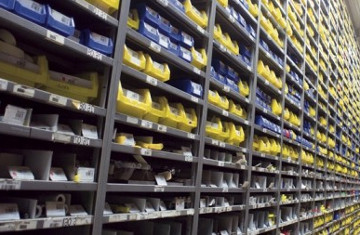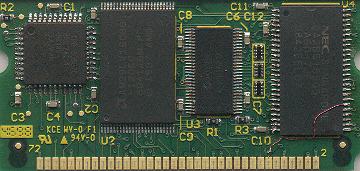
Low Quality Manufacturing

In the final article in this series, I want to explore some of the ways that we have become a throw away society and show how the manufacturers have been willing architects of this situation. The development of the throw away society is certainly no accident, since it has come about through the deliberate choices of manufacturers and the decimation of the repair industry.
Whilst I do not think they all intended, or even anticipated the situation to arise quite in this way, they have been led to make choices as a result of human greed. The kind of pressure manufacturing companies are under to demonstrate growth is no different from those of other companies, so it easy to see how this situation has arisen.
For a business that is reliant on manufacturing, their ultimate goal is to increase sales of units. This is what shareholders ask of them and, very clearly, it is desirable for any business to grow and thrive for it to be an investment proposition.
What is one way in which sales growth could be slowed?
If you think about it, everyone already has a washing machine, a computer, or a phone. The market is pretty much saturated and companies are not trying to attract new customers to buy their products as such. Hence the focus is on 'market share' and dominance.
This is mostly achieved by trying to advertise a product on the basis of its desirability (aka linking the product with emotional dispositions) rather than its actual merits or utility. Unfortunately, this even means that some people will throw out things that still work perfectly well just because they 'look' a little dated. It is almost as if a rust blemish on a washing machine somehow says something about you as a person.
Imagine if everyone fixed their machines instead of buying new ones. Think about this and it is reasonable to conclude that manufacturers profits would decrease, and their share price would ultimately fall. This then raises the question of why would manufacturers ever want to support such an endeavour that ultimately hurts their sales?
We are at a loss to provide any account of what motivation manufacturers might have to support any kind of repair industry. Besides trying to tie peoples self esteem to material goods through clever marketing, the manufacturers have another solution to the problem of people who actually want to repair their goods.
Cost of spare parts
One way they do this is by artificially inflating the price of spare parts. For instance, fridges are no longer economically viable to repair. If you needed a new magnetic door seal, you often cannot buy one without paying for a whole new door and if you paid out for that, you would be 70% of the way to buying a whole new fridge.
Same with toner cartridges which are often more expensive than the actual printer. Imagine a car where you could never replace the tyres... It is exactly the same kind of thinking behind it, I doubt car manufacturers would have the audacity to try this on. Yet.

In the manufacturers defence it is not cost effective for them to hold on to vast stocks of spare parts, or provide service for old legacy machines, from 30 years ago say, since the number of machines in service will have dwindled.
Clearly they make more money selling new units, and it is actually in their interests to discontinue spare part lines early, leaving you with nowhere to turn. Now we are mindful of this it is easy to see, in part, how the throwaway society mindset has been given a helping hand to thrive.
Not only this, but any incentive to move away from this model is illogical from an economic point of view. Hence, there is no reason why manufacturers would want to change voluntarily. Any CEO who developed a 'conscience' would be savaged by a pack of angry shareholders and it appears that we are stuck with this problem for the foreseeable future.
However, there has been a fledgling industry growing, where manufacturers have seen a gap in the market. These manufacturers have started mass producing spare parts for certain devices. A certain tech company named after a fruit does not make spare parts available for their products, and as a result, there is a thriving business for non official spare parts. Perhaps this is one of the ways in which the tide will turn for servicing popular products, we will have to see.
Shoddy goods are irritating but they have actually become the norm now. It has got to the stage where we do not expect anything to last.
Poor Build Quality
In the incessant drive for profits one of the other ways manufacturers can maximize their bottom line is simply by getting cheaper materials. With their huge manufacturing base, the Chinese have facilitated the global race the bottom in terms of price per unit and quantities manufactured. It is prosaic to claim: “They don't make 'em like they used to” but it is certainly true.
Designs change, things are made more efficient and often functionality is improved. However, it cannot escape you that things are not made to last. Again, it is not really in a manufacturers interest to have their items last ten years.

If they can just hold together past their warranty obligations (if you are lucky!), by that time technology has moved on and it is easy enough to sell you a new one. Essentially, the idea of product engineering now is to make stuff so cheaply that quality is sacrificed on the altar of profits.
Stuff used to be engineered to last but this is no longer in the manufacturers interests. In fact some products that are manufactured do not even work, check out the cheap soil pH meters on ebay for instance. The product is actually junk and does not do what it states, yet these are being mass produced because some poor sap will buy them. Yes, I bought one and was disappointed to find out that it is actually impossible to test soil pH with one of these meters!
Some manufacturers don't even care that their products actually work, whilst others are not bothered about making sure their products are going to be in it for the long haul. Unfortunately, it is us who are getting fleeced in the end as we are having to buy stuff more frequently thus generating more waste and increasing our environmental impact.
We think we are saving ourselves a few quid buying these cheaper imports but ultimately it is costing us both financially and environmentally in the long term. It also has a human cost for the poor folks working in sweat shops and enduring appalling conditions all for a pittance. The only winners here are the manufacturers and their shareholders.
Shoddy goods are irritating but they have actually become the norm now. It has got to the stage where we do not expect anything to last. Manufacturers are free to churn out low quality wares off the back of cheap labour, provide poor customer service, refuse to repair the piece of junk you have bought from them, and all so they can sell you another one in two years time.
If you get a manual in English you might even believe you have bought something of quality, but rest assured your product has been designed only to live just past its warranty obligations.
Compatibility
It is not in a manufacturers interest to have new functionality being backward compatible. As far as a computer manufacturer is concerned it is preferable for you to have to buy a whole new computer system including power supply, RAM, motherboard, and processor, rather than just being able to put the latest RAM and CPU in to upgrade your current system.,
There is one computer manufacturer named after a fruit that has made proprietary power connectors to ensure that chargers for old models cannot be used with their new products so they can charge vastly inflated prices for replacement power chargers.
They also removed the 3.5mm headphone socket of their latest phone and blatantly lied that it improves the audio quality (Its actually the digital – analogue converters that is the arbiter of audio quality), all so any third party manufacturers would have to licence their proprietary technology.
It should also make sense to you that they make their products difficult to repair for technicians on purpose, after all they invented a special screw in order to try and stop third parties from servicing their products. These folks have no real interest in making things better for you, they are solely focussed on trying to weasel as much cash out of you as they can.

In some instances technological revolutions come along that mean older designs cannot cope with new developments. Computer chips are limited by the conductance of materials and some developments in chip design mean old hardware will not work with these new developments.
That is fine, but by and large, many changes are related to making consumers spend more money and some manufacturers even bank on their products becoming quickly obsolete (built in obselesence), or they wouldn't be able to bring out new phones every year.
Whilst it is a stretch to say that phone manufacturers deliberately slow down their old tech with software updates, it is not fanciful to see how they use the progress of technology to make devices obsolete. For example, they nag you every time you open your home screen to update, and when you realise your device cannot handle the latest update, you cannot roll back this update to a previous version, unless you want to get in to hacking phones.
Yes, technology rapidly progresses and software is more power hungry as it can do more stuff, however, tech companies don't make it easy for you to keep running a nimble device. The bottom line is if you want the latest tech, you need the latest gadget to run it. Don't expect it to be current for too long, and don't expect any support from the manufacturers when you realise your gadget runs at a snails pace.
Lock In
Another strategy that manufacturers use is to try and lock you in to servicing. This is done by offering you rip off insurance deals. What they don't tell you is that by the time your insurance is used, you have already paid for a new machine plus the insurance companies profits I suppose they are useful in the even that something is built so shoddily it falls apart in under 12 months.
Another ploy is the old free parts warranty. These parts are certainly free, however, the labour cost certainly isn't. In fact it is extortionate and for a very good reason. To make you think you may as well by a new one.
Car manufacturers are starting to play this game now, but technology manufacturers have been at it for quite a while. The idea is to lock the after sales support in to the company. Using their brand as leverage, people are offered deals in order to make them think they are being looked after. However, they are charged exorbitant prices when they could have got a better deal from an independent.
Not only does this lock the customer in to servicing with the same company, it is also designed to squeeze out independent repairers from servicing their goods. There is a certain computer company named after a fruit who have tried to crush the independent repair industry, and despite their best efforts they have failed.
However, they have certainly tried their best to destroy independent repair shops by withholding crucial technical information, not making parts available, and convincing customers that they should only go to their approved service centres, and pay over the odds.
Miniaturisation

In many ways this has been a good thing, just think about the old house brick sized mobile phones we used to carry around. Being able to fit a CPU inside touch screen phones is incredible when you think about it. However, this makes the job of a repair technician increasingly harder as some jobs require microscopes as the components are becoming smaller.
The 0402 specification SMD electronic components are minuscule and really hard to work with. Many of the components are poorly marked and very difficult to identify. Trying to find a replacement can be an absolute nightmare even if you have isolated the faulty component, as you have to look up codes and hope they have used ubiquitous components.
Add to this the fact that to get access to some components requires completely disassembling a device which is time consuming, and sometimes you even find a cunning trap set by the manufacturer to try and deter technicians.
That computer company named after a fruit make a popular mp3 player where to get at the battery requires you to meticulously disassemble the device and then de-solder the battery connections. Only they cover the solder pads with silicon to try and stop you from changing the battery and some people end up damaging the PCB by overheating it.
Yes, miniaturisation is a good thing in many ways but unfortunately it makes it harder for engineers to fix them. It also means that repair jobs are more fiddly, stuff is harder to take apart, and components are hard to identify. However, this is the trajectory we are heading in, so unfortunately this is something that repair engineers will have to learn to live with and adapt to.
So, who would want to go in to this field with the odds stacked against them like this? Well, somebody who cares about the environment, thinks hyper consumerism is bad, despairs that large corporations are fleecing us, despises things that fall apart in no time, and someone who has always enjoyed electronics and technology.
What does the future hold?
On a more positive note, there have been recent developments in the world of repair where there are signs that the tide is turning. In Michigan the state ruled against car manufacturers trying to squeeze out independent garages from servicing cars. They tried to withhold fault codes from independent garages and the state ruled this is anticompetitive.
Arguably then, there is no logical justification for electronics companies to squeeze out independent repair shops and withhold service information. Moreover, it contradicts the very free market principles that neo-liberals harp on about endlessly.
This journey will be a long slog as, no doubt, whichever party is in government will receive significant pressure from lobbyists to protect their interests. After all, this is the best democracy that money can buy and companies like Apple have billions to try and stop the government from acting in the interests of fairness.
Right here we have shown that, in this little microcosm of electronics repair, how the free market really operates. It is only as 'free' as you have the cash to tilt the game in your favour. Any such notions of freedom and fairness are laughable when you see how the system is rigged in favour of corporations.
Oh did we go off tangent? Ahem, anyway, in Sweden there are discussions about encouraging electronics repair by removing VAT from such services. Such a move is designed to create the conditions for reusing technology and avoiding the problem of e-waste as much as possible. Not only that, it could also help put pressure on manufacturers to make the tech more user serviceable.
I would have liked to have seen this initiative spread Europe wide and even if we are 'brexiters', we have to admit that the EU have led the way on climate change globally.
It would have been nice to see this adopted in the UK eventually but I think the government would be under too much pressure from lobbyists to do the right thing. However, I hope I am pleasantly surprised one day.
